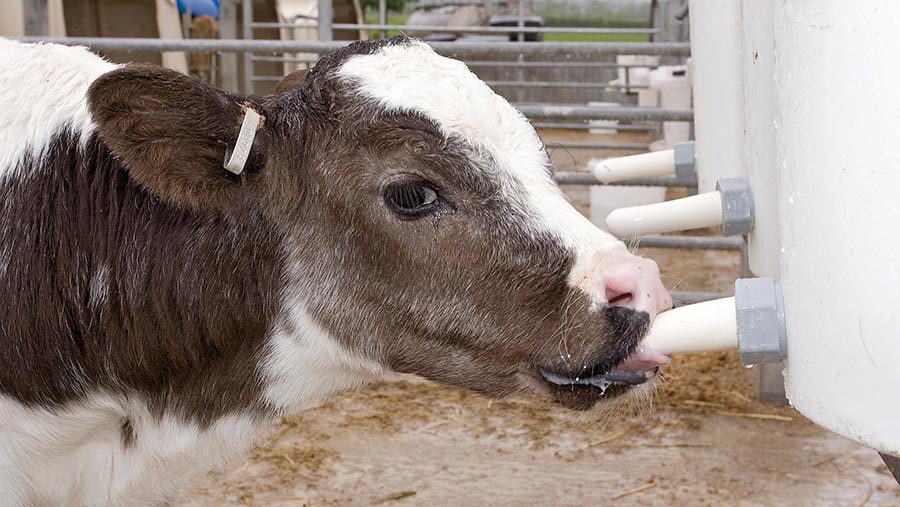Tips on getting reluctant calves to suck a bottle
 © Jonathan Page
© Jonathan Page There are few things more frustrating than an otherwise seemingly healthy calf that just refuses to suck.
In this article, vet Nichol Fisher from Daleside Veterinary Group discusses some of the possible reasons and solutions for this scenario.
See also: 6 signs of pneumonia in calves to look out for
Common causes
There are several reasons why calves will not or cannot suck. Here are some of the main ones:
Congenital abnormalities
These make sucking very difficult, such as a cleft palate. This should always be ruled out from the start by opening the calf’s mouth and checking inside.
A cleft palate is a defect in the roof of the mouth where the soft and hard palate have failed to close during development.
As a result, the calf has a linear gap in the roof of its mouth which communicates directly with the nasal canal.
A cleft palate can be seen or felt if the mouth is held open and the roof of the mouth is viewed with a light or head torch.
Calves with a cleft palate have difficulty drinking milk because much of what they take in comes out through the nose or is inhaled, putting them at risk of aspiration pneumonia.
Premature calves
These calves have immature lungs and struggle to oxygenate their tissues and get rid of carbon dioxide.
This results in a condition called acidosis which diminishes the suck reflex and impairs absorption of the antibodies in colostrum.
Difficult births
Calves that experience a difficult or prolonged birth (typically large calves requiring assisted calving) can also end up with acidosis if the umbilical cord is compressed or ruptured prematurely, resulting in inadequate oxygenation.
This explains why it is often “big, dopey calves” that will not suck – their size predisposes them to having a difficult birth, and they are “dopey” as an effect of the acidosis.
Signs of severe acidosis
-
Unable to sit in sternal recumbency unaided
-
Unable to lift its head 15 minutes after birth
-
Lethargic
-
Lack of suck reflex
-
Laboured/fast breathing despite mucus having been removed from airways
Poor calves
Calves with reduced vigour due to poor cow nutrition prior to calving and/or selenium deficiency.
Scours
Scouring calves can end up with metabolic acidosis due to lactic acid formation – acidosis diminishes the suck reflex. Additionally, sick calves often have a reduced appetite.
Bonding
Calves that have sucked from the cow and have been allowed to bond and are subsequently taken off the cow may refuse to drink from a plastic teat or bucket.
Anecdotally, this seems to be reported more often in certain breeds such as Brown Swiss.
Myth busting: What not to try
There are many suggestions for getting “stubborn” calves to suck, but not all of them are advisable.
- “Starve the calf for varying amounts of time to make it hungry.” This may work with an otherwise healthy calf that has bonded with its dam and does not want to drink from a plastic teat, but starving a young calf with very little body reserves is risky, and growth will definitely take a knock, so it is not advisable.
- “Throw the bucket of milk over the calf’s back and let it soak in. It will drink the next day.” You will end up with a cold, wet and sticky calf and, needless to say, no milk will be absorbed through the skin. Do not do this.
- “Put honey/chocolate/condensed milk on a finger/teat.” This may help to tempt an otherwise healthy calf to drink from a plastic teat, but it will not help with any of the other scenarios mentioned above.
- “Inject the calf/dose orally with various multivitamins/selenium.” This will help if the calf is actually deficient, but how do you know?
Solutions
Establishing the cause is essential.
Acidosis
For calves that have no suck reflex due to acidosis, veterinary treatment is needed. This usually involves administration of sodium bicarbonate and/or oral or intravenous fluids.
An acidotic new-born calf will be slower to sit itself up and lift its head. Try not to leave them lying on their side as this further reduces oxygenation of the lower lung.
Ensure any mucus is removed from their airways, and if they are not sitting up unaided 15 minutes after birth, consider speaking to your vet.
Weakness
For weak, deficient calves, supplementation with selenium, vitamin E and anything else they are lacking should help, but really you need to get to the root of the problem.
Assess the quality of the ration for cows close to calving and speak to your vet about possibly taking some samples to check for deficiencies.
If you are getting a lot of weak calves (more than 3% in the absence of any other explanation) with poor energy and little desire to suck, the answer may be to supplement the cows or tweak their diet.
Older scouring calves
For older, scouring calves (usually five days and above), mild cases may be resolved with oral fluids, but if this does not work and the suck reflex does not return, again these calves need veterinary attention.
No clinical issues
For calves that genuinely have little wrong with them, except they do not want to drink from a rubber teat or bucket, perseverance and patience are key.
If there is nothing clinically wrong with them, they will drink eventually. Flavouring the teat as mentioned above can definitely help in some cases. Trying different sizes and shapes of teat may also help.
However, this transition is made infinitely easier with dairy calves (and less confusing for the calf) if they are not given the chance to suck from the cow first, along with all the other benefits that snatch-calving has from a disease-control perspective.
